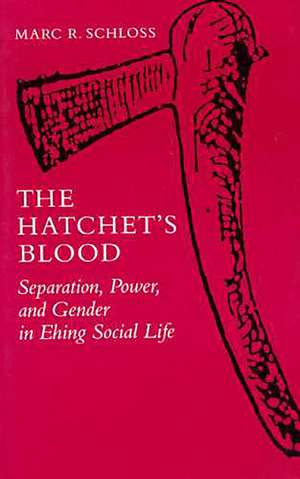The Hatchet's Blood: Separation, Power, and Gender in Ehing Social Life
Autor Marc R. Schlossen Limba Engleză Paperback – noi 1992
Winner of the Royal Anthropological Institute’s Amaury Talbot Prize for African Anthropology
The ritual complexes of the Ehing, a farming people of southern Senegal, embody an elaborate set of prohibitions on social behavior and prescribe the general rules of Ehing social organization. Power is distributed and maintained in Ehing culture by the concept of Odieng (“hatchet”), which as a spirit acts upon human beings much as an ax does upon a tree, falling from above to punish its victims for transgression. Marc R. Schloss’s ethnography of the Ehing is a study of the meaning of Odieng’s power, explaining why its rules are so essential to the Ehing way of life.
The ritual complexes of the Ehing, a farming people of southern Senegal, embody an elaborate set of prohibitions on social behavior and prescribe the general rules of Ehing social organization. Power is distributed and maintained in Ehing culture by the concept of Odieng (“hatchet”), which as a spirit acts upon human beings much as an ax does upon a tree, falling from above to punish its victims for transgression. Marc R. Schloss’s ethnography of the Ehing is a study of the meaning of Odieng’s power, explaining why its rules are so essential to the Ehing way of life.
Preț: 164.08 lei
Preț vechi: 231.53 lei
-29% Nou
Puncte Express: 246
Preț estimativ în valută:
31.40€ • 33.57$ • 26.18£
31.40€ • 33.57$ • 26.18£
Carte indisponibilă temporar
Doresc să fiu notificat când acest titlu va fi disponibil:
Se trimite...
Preluare comenzi: 021 569.72.76
Specificații
ISBN-13: 9780816513642
ISBN-10: 0816513643
Pagini: 178
Dimensiuni: 152 x 229 x 15 mm
Greutate: 0.29 kg
Ediția:3
Editura: University of Arizona Press
Colecția University of Arizona Press
ISBN-10: 0816513643
Pagini: 178
Dimensiuni: 152 x 229 x 15 mm
Greutate: 0.29 kg
Ediția:3
Editura: University of Arizona Press
Colecția University of Arizona Press
Notă biografică
Marc R. Schloss is a cultural anthropologist who received his Ph.D. from the University of Virginia. He has taught anthropology at Virginia, the University of South Carolina, Sweet Briar College, and Bucknell University. This book on the late Ehing people draws from his twenty-two months of research in Senegal in the late 1970s.
Recenzii
“This account of the Ehing people of Senegal examines the cultural meanings embedded in ritual, myth, and belief and does so within the broad framework of symbolic anthropology. . . . In examining the relationship between symbols and social life, this clearly written and closely reasoned book confronts a perennially important question in anthropological theory. . . . Clearly written and closely reasoned.”—American Anthropologist
“Ethnography at its best: a rich immersion in a foreign system carried out in a theoretically sophisticated way. . . . Non-Africanists would also do well to consider using it in courses on comparative kinship and religion.”—American Ethnologist
“An important work that provides an introduction to the Ehing ritual system and a careful study of the relationship between systems of thought and social structure in an agricultural society.”—Journal of Religion in Africa
“Ethnography at its best: a rich immersion in a foreign system carried out in a theoretically sophisticated way. . . . Non-Africanists would also do well to consider using it in courses on comparative kinship and religion.”—American Ethnologist
“An important work that provides an introduction to the Ehing ritual system and a careful study of the relationship between systems of thought and social structure in an agricultural society.”—Journal of Religion in Africa
Descriere
Winner of the Royal Anthropological Institute’s Amaury Talbot Prize for African Anthropology, The Hatchet's Blood is the first ethnography of the Ehing, a farming people of southern Senegal. The ritual complexes of the Ehing embody an elaborate set of prohibitions on social behavior and prescribe the general rules of Ehing social organization. Power is distributed and maintained by the concept of Odieng (“hatchet”), which as a spirit acts upon human beings much as an ax does upon a tree, falling from above to punish its victims for transgression. Marc R. Schloss’s ethnography is a study of the meaning of Odieng’s power, explaining why its rules are so essential to the Ehing way of life.
